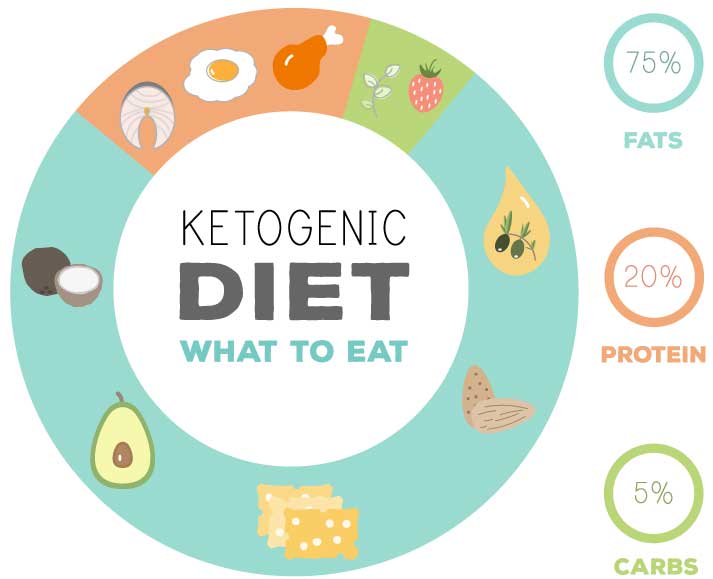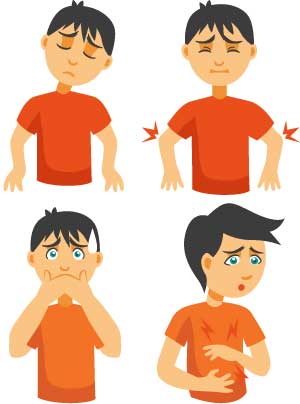Introduction
What is the Keto diet and is it healthy? That's what we will answer here.
If you are trying to lose weight we recommend some form of resistance training but diet is even more important than exercise.
Let's just start out by saying that we at FitManPlan are not big fans of diets that eliminate large groups of foods. They may offer short-term results, but if they are not something you can maintain over the long term then they can do more harm than good.
Plus, there are often no studies that confirm whether or not these diets are safe. There's no telling what these can do to your internal organs and it may be too late once you find out they are causing you harm.
That said, there are parts of the keto diet that may make sense.
What is a Keto Diet?
The keto diet, or also known as ketogenic diet, is a high-fat, adequate-protein way of eating that forces the body to burn fats instead of carbohydrates (sugars). So those fats are hopefully the extra fat around your belly and other places of your body.
From a technical definition, the goal of a Keto diet is to get your body in the state of ketosis where there are ample ketones in your blood stream.
So let's start with defining what ketones are. In short, keytones are fuel your body uses to produce energy to feed your brain, heart, tissues, and muscles.
But your body doesn't normally produce ketones for energy. It normally uses glucose (sugar) as a it's primary energy source. However, when the body runs out of glucose it can convert to burning fat. When this happens the liver converts the fat to ketones.
Using fat as fuel probably results from the days when people did not have the capability of eating three meals a day. In fact, sometimes they weren't able to eat for days. So the body had to rely on fat reserves for energy.
These days our diets are so full of carbohydrates your body seldom has the need to produce ketones. They are only produced with high-fat, low-carbohydrate diets, prolonged exercise, or fasting/starvation. Unfortunately for busy men these situations rarely occur.
I threw out one other word you need defined and that was ketosis. Ketosis just means your body is in the state where it produces ketones. The state of ketosis is what you want to get in when you are doing the Keto diet since that is what burns the fat.
Is a Keto Diet Safe?
One form or another of the Keto diet has been around for decades. But it has mainly been used for children with epilepsy.
A 2004 study published in the journal Clinical Cardiology that concluded, "the present study confirms that it is safe to use a ketogenic diet for a longer period of time than previously demonstrated." (1)

However it should be noted that this study was only 24 weeks long so it still does not verify that the diet is safe over many years.
The Mayo Clinic has a different opinion: "Mayo's verdict: While the ketogenic diet may be recommended for some people with uncontrolled epilepsy, the high fat content — and especially the high level of unhealthy saturated fat — combined with limits on nutrient-rich fruits, veggies and grains is a concern for long-term heart health." (2)
Joanna Clay of University of Southern California voices the same concern about nutritional content of the diet. According to Joanna, "One of the problems with a Keto diet is that it doesn't provide all the nutrients your body needs. So it is recommended that you supplement it with fresh fruits and vegetables. It's also not clear how the diet could affect bone health" (3)
As I voiced my concerns about any sort of restrictive diet I am not alone. Dr. Marcelo Campos in an article on Harvard Health Publishing says: "We also do not know much about its long-term effects, probably because it’s so hard to stick with that people can’t eat this way for a long time. It is also important to remember that “yo-yo diets” that lead to rapid weight loss fluctuation are associated with increased mortality." (4)
There is ample evidence that any sort of restrictive diet is harmful and the yo-yo effects of weight loss and weight gain are harmful to your body. It's better to not diet at all than to start one of these diets. We believe it is better to make a long-term change to your way of eating that is balanced with all types of food groups. But there are parts of the keto diet that make sense so we aren't totally against it.
However, you don't really need to follow the Keto diet. "Michael Goran, a Keck School of Medicine obesity researcher, said you can get the same results as the keto diet without being so extreme. He advises his patients to cut out added sugars—sodas, juices, processed foods—and simple carbohydrates that metabolize into sugar faster and lack fiber." (3)
So my conclusion is that the safety of the Keto diet really depends on how you do it. If you do it with the proper foods and are still getting balanced nutrition, then it can be okay. Dr. Kellyann of www.drkellyann.com says, "Healthy fats on the keto diet, or any diet for that matter, must come from whole foods and be minimally processed. This includes foods such as coconut, avocado, olives, nuts, seeds, wild fish, and grass-fed dairy." (5)
I personally would not try the keto diet, but I do try to start out my day with a breakfast that looks a lot like a Keto diet. It keeps your body from creating a post-breakfast sugar spike that then encourages you to crave carbs later in the day. Just this change alone has helped me lose weight.
How to Do a Keto Diet
As stated above, there are really only three methods to get your body in a state of ketosis: a high-fat, low-carbohydrate diet, prolonged exercise, and fasting/starvation. But a true Keto diet is all about the high-fat, low-carbohydrate meals.
A typical keto diet is about 75% fats, 20% protein, and just 5% carbs. So the foods chosen should be primarily high in fat, moderately high in protein, and very low in carbohydrates.

Try to avoid starchy foods like potatoes, rice, bread, and pasta. Of course you will also totally avoid all sugary foods like desserts and candy. You should avoid all processed foods completely since they are typically loaded with a lot of ingredients that aren't in agreement with keto, or any healthy diet for that matter.
It is important to note that you will likely not achieve the state of ketosis if you cheat by drinking even one soda or sugar-laden dessert. Once you load up your body with sugar you are back to burning carbohydrates instead of fat. So you need to commit to the diet, which is why the failure rate of people dropping the diet is so high.
Keto Foods
Keto-Perfect Oils and Fats
Avocado oil, almond butter, bacon fat, Brain Octane Oil, cacao butter, coconut oil, cod liver oil, egg yolk, grass-fed butter and ghee (clarified butter), krill oil, lard, marrow, MCT oil, olive oil, sunflower lecithin, tallow
Keto-Perfect Protein
Collagen peptides, colostrum, dark meats, eggs, fish, gelatin, offal/organ meats, pork, shellfish, whey protein concentrate
Keto-Perfect Vegetables
Anaheim peppers, Arugula, asparagus, avocado, bell peppers, bitter greens, bok choy, broccoli, Brussels sprouts, cauliflower, cabbage, celery, chard, collards, cucumbers, eggplant, endive, fennel, green beans, jalapeno peppers, kale, kohlrabi, lettuce, mushrooms, nori, olives, peas, radishes, red bell peppers, spinach, summer squash, tomato, zucchini
Keto-Perfect Nuts
Almonds, Brazil nuts, hazelnuts, macadamia nuts, pecans, walnuts
Keto-Perfect Dairy
Grass-fed butter, grass-fed colostrum, grass-fed ghee, chedder cheese (harder cheeses typically have fewer carbs).
Keto-Perfect Beverages
Bone broth, diluted coconut milk, coffee, Bulletproof coffee (with saltfree, organic butter), filtered water with lemon/lime, high-quality green tea, mineral water
Keto-Perfect Fruits
Avocado, blackberries, low-fructose berries, coconut, cranberries, lemon, lime, raspberries, strawberries
Keto-Perfect Seafood
Alaskan salmon, Cod, Herring, Mahi mahi, Mackerel, Perch, Rainbow trout, Wild Salmon, Sardines, Striped bass, Tilapia, Tuna,
Keto-Perfect Meats
Bacon, grass-fed beef, organ meats
Keto-Perfect Spices & Seasonings
Apple cider vinegar, Ceylon cinnamon, cilantro, cocoa powder, ginger, mustard, oregano, parsley, rosemary, sea salt, thyme, turmeric, vanilla bean
Keto-Acceptable Sweeteners
Allulose, erythritol, maltitol, monk fruit, sorbitol, stevia, birch xylitol
Keto Side Effects
With keto you will likely experience what has been nicknamed the "keto flu." Drastically dropping carbohydrates can product side effects similar to what a drug addict will experience when they try to stop using their drug of choice. Your effects won't likely be quite a severe, but you may experience many of the following symptoms:

Fortunately these symptoms are only temporary and should go away in a week or two. The only way to get through it is to just power your way through it or you can ease into your new diet.
You also want to stay well hydrated. Water is of course the choice drink, but tea and coffee are okay too. Just make sure your drink of choice doesn't add carbs. A new trend in coffee drinking is to add fat to it such as unsalted, grass-fed butter. Or you can add coconut oil or use both.
Since your electrolyte and sodium level may be reduced, you may also want to drink bone broth or add some Himalayan Pink Salt to some water or a smoothie and drink it. Low levels of these can cause flu-like symptoms as well.
Another thing that may help is to take a magnesium supplement and eat foods that are rich in potassium like avocados, mushrooms, spinach, nuts, and salmon.
If you really want to do the Keto diet then you'll have to tough it out but hopefully these pointers will help you out.
Resources:
1 Clinical Cardiology: Long-term effects of a ketogenic diet in obese patients: https://www.ncbi.nlm.nih.gov/pmc/articles/PMC2716748/
2: Mayo Clinic: The truth behind the most popular diet trends of the moment: https://www.mayoclinic.org/healthy-lifestyle/weight-loss/in-depth/the-truth-behind-the-most-popular-diet-trends-of-the-moment/art-20390062
3: Joanna Clay, University of Southern California: Is the keto diet safe? USC experts have some serious concerns: https://medicalxpress.com/news/2019-02-keto-diet-safe-usc-experts.html
4. Marcelo Campos, MD, Harvard Health Publishing: Ketogenic diet: Is the ultimate low-carb diet good for you?: https://www.health.harvard.edu/blog/ketogenic-diet-is-the-ultimate-low-carb-diet-good-for-you-2017072712089
5. Is the Ketogenic Diet Safe?: https://www.drkellyann.com/is-the-ketogenic-diet-safe/

Tim Bruxvoort is founder of FitManPlan.com whose mission it is to help men over 40 live the best version of their lives through fitness, nutrition, pain management, and improved life skills. He is a long-time, aging entrepreneur and health enthusiast who has experienced many of the challenges currently being faced by other men over 40 and his goal is to deliver solutions to help them achieve their fitness and health goals.
